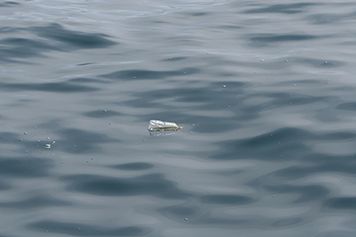Celebrate and Protect the Ocean with us on World Ocean Day
JUNE 6, 2014 -- At NOAA's National Ocean Service, we're honoring all things ocean the entire month of June, but if you have only one day to spare, make it this weekend. Sunday, June 8 is World Ocean Day. As we commemorate this interconnected body of water which sustains our planet, consider how each of us can be involved in both celebrating and protecting the ocean. To celebrate it, we suggest you learn something new about the ocean and share it with at least one friend (perhaps by sharing this blog post). Then, tell us which actions you're taking to protect the ocean. We have a few examples to get you ready for both.
Learn to Love the Ocean
Did you know that ...
- The world’s longest mountain range is mostly underwater?
- Bowhead whales, which dwell in the Arctic Ocean year-round, can live more than 200 years?
- The Hawaiian Islands form an archipelago extending more than 1,500 miles across the North Pacific Ocean?
- The ocean is blue because the water acts like a sunlight filter?
- The most venomous marine animal is the Australian box jellyfish, with tentacles up to 10 feet long?
- Light rarely travels deeper than about 656 feet (200 meters) down in the ocean?
You can learn even more about the ocean and coastal areas by visiting a National Marine Sanctuary or National Estuarine Research Reserve and getting a hands-on education.
Act to Protect the Ocean
Now that you’re hopefully feeling inspired by our amazing ocean, you’re ready to do something to protect it from its many threats, such as ocean acidification (global warming’s oceanic counterpart), pollution, and habitat degradation. Here are some ways you can help:
- Host or join a cleanup at a beach, lake, or river near you. Mark your calendar for the International Coastal Cleanup on Saturday, September 20, 2014.
- Eliminate microbeads (those tiny bits of plastic) from your face scrub and help keep plastic out of the ocean and Great Lakes.
- Reduce your use of synthetic fertilizers and pesticides in your lawn and garden. This keeps these chemicals and excess nutrients out of the groundwater, lakes, rivers, and, of course, eventually the ocean (and doesn’t contribute to the size of the Gulf dead zone). Try some of these more environmentally safe lawn care alternatives instead.
- Make our work easier and keep the coastal environment cleaner by introducing walking, biking, or public transit into your daily routine for trips close to home (69 percent of trips made by car are to locations two miles away or less). NOAA responds to between 100 and 150 oil and chemical spills each year. Less oil used means less oil transported and potentially spilled.
- Skip the plastic bags and bring your own reusable bag to the store. (Here’s a neat tip for making your own bag from a tank top!)
- Keep cigarette butts off of beaches and out of storm drains by properly disposing of them when you see them and discouraging others from discarding them as "acceptable" litter. Cigarette butts are not biodegradable and are the most commonly found piece of trash at beach cleanups.
- If you have waterfront property, learn about alternatives to "shoreline armoring" and help create healthier shorelines for endangered salmon.
The more we all know and care about the ocean, the more we will do to take care of it. Do your part this World Ocean Day and every day.
 An official website of the United States government.
An official website of the United States government. 

